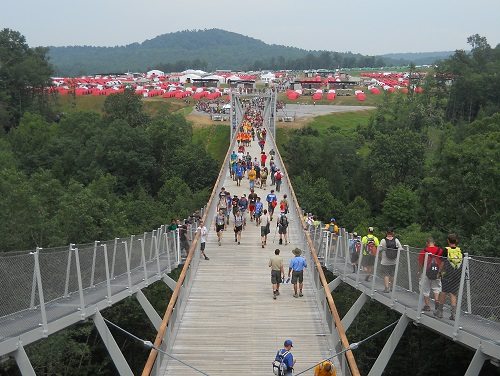
October 16, WBOY-TV (Clarksburg, WV)
The dust has not settled yet following the Boy Scouts of America’s decision to allow gay scouts but not scoutmasters, and the organization’s reputation is still tarnished. Readers of NPQ will recall the storm around the decision to allow gay scouts. It wasn’t pretty, with neither side of the argument feeling like the compromise decision made total sense. Membership in the Scouts has dwindled, and several conservative troops have threatened to create their own organization.
Now, one of the investments BSA made that they thought would help is causing headaches. The Summit Bechtel Reserve in Fayette County, West Virginia, is a large action/adventure park filled with ziplines, huge treehouses, skate parks, and a stadium that can seat 85,000 people. It was built with the idea that a “cool” park would attract young men to the Boy Scouts and turn the tide of drooping enrollment. It does not appear to be working. Instead, BSA is turning to voters in the state, asking them to amend the constitution in a way that would allow the Scouts to rent out the facility without losing their nonprofit status.
Apparently, there is an interpretation of the West Virginia constitution dating back to the 1940s that would force the Scouts to lose the tax-exempt status for their property if they rented out the park to anyone other than their members.
Called the Nonprofit Youth Organization Tax Exemption Support Amendment, the ballot reads, in part:
Sign up for our free newsletters
Subscribe to NPQ's newsletters to have our top stories delivered directly to your inbox.
By signing up, you agree to our privacy policy and terms of use, and to receive messages from NPQ and our partners.
“To amend the State Constitution to exempt from property tax certain properties in this state owned by nonprofit youth organizations and built at cost of at least $100 million whether or not the property is used for the nonprofit youth organization’s charitable or nonprofit purpose to help raise funds for the benefit of the nonprofit youth organization. If approved, the Legislature would be required to enact laws that would protect local and regional businesses from unfair competition and unreasonable loss of revenue caused by the nonprofit organization use of the tax exemption.”
There is, in fact, only one facility that would fit the description in the wording: the BSA Summit Bechtel Reserve.
The Bechtel Summit Reserve was built in Fayette County because a large majority of the U.S. population is within a 10-hour drive, so it could attract a lot of visitors. Originally projected to cost $175 million, it appears the cost has been between $350 and $400 million or more. The BSA used a funding mechanism known as conduit bonds, which essentially borrow the name of a local government to raise cheap financing. In at least three issues of bonds, $275 million was raised for BSA, with Fayette County receiving $100,000. With conduit bonds, the government is generally not required to make any payments even if the revenue of the project being funded does not meet expectations.
In order to maintain the facility in a manner that would keep it in tiptop shape, the BSA say they need to rent it to outside groups. (Concerts could be held in the arena, for example.) Under the current interpretation of the constitution in West Virginia, that would amount to commercial use of the property, which would jeopardize its tax-exempt status.
Arguments for the amendment suggest that it will attract more visitors to the area and so could boost the local economy. Arguments against it center on the unfair competitive edge it would give the facility, causing other venues to suffer.
What it boils down to is West Virginians voting whether or not to amend their constitution to benefit one struggling 103-year-old nonprofit. Maybe they should just call it the BSA Amendment.—Rob Meiksins











